Identifying Core Academic Skills for Business and Tourism Degree
VerifiedAdded on 2023/06/04
|8
|2010
|332
Essay
AI Summary
This essay examines the critical academic skills necessary for success in a Business and Tourism Management degree program. The introduction establishes the significance of academic skills in business, highlighting the importance of research, proofreading, note-taking, and time management. The main body delves into these four core skills, providing detailed discussions on research methodologies, planning strategies, academic tone, and time management techniques. The essay emphasizes the practical application of these skills and their impact on career development. Research skills are explored through searching power, problem-solving, and reliable sources. Planning skills are detailed through structuring, goal setting, and KPI setting. Academic tone is discussed via professionalism, fact inclusion, and sentence completeness. Time management skills are addressed through prioritizing work, scheduling, and avoiding multitasking. The conclusion summarizes the importance of these academic skills, reinforcing their role in academic and professional achievement.
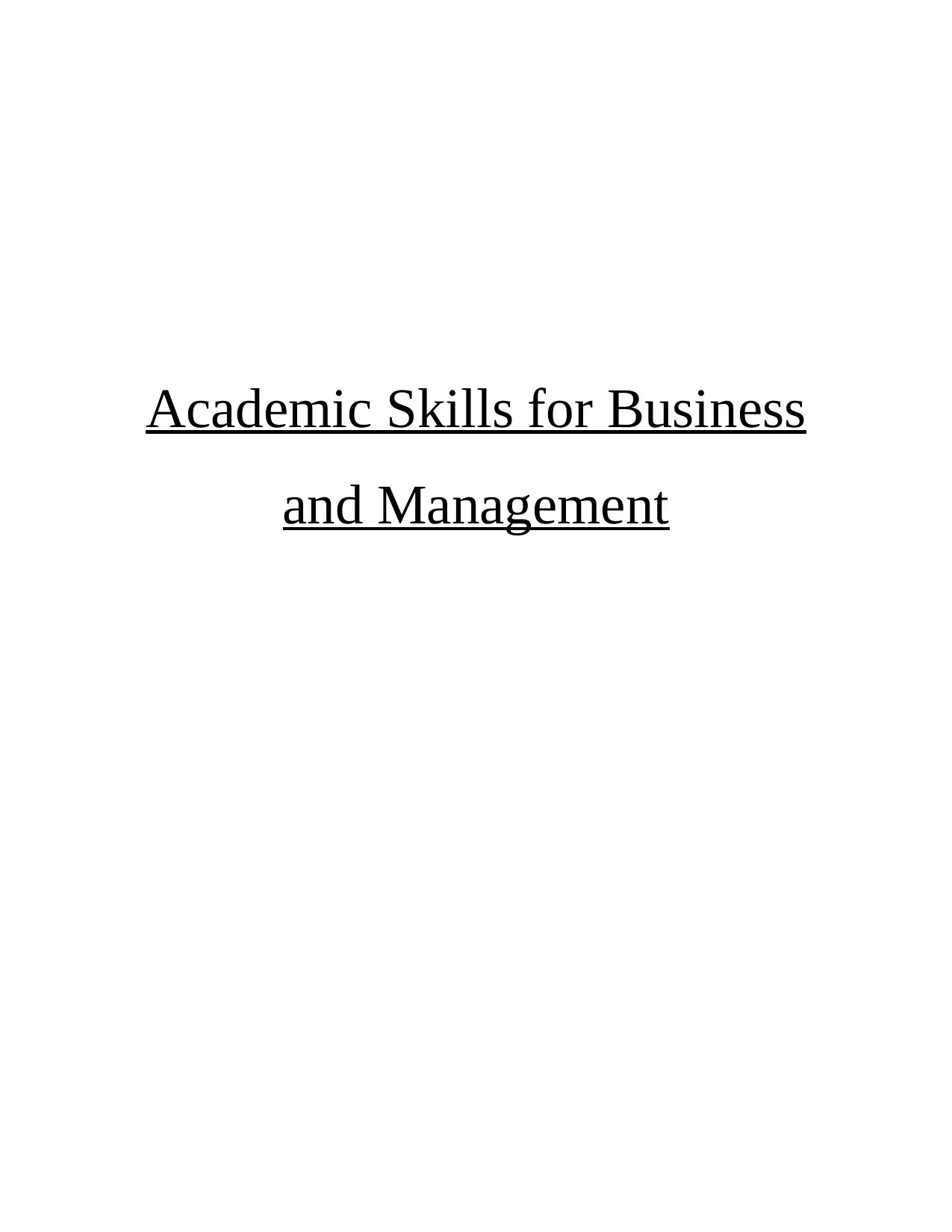
Academic Skills for Business
and Management
and Management
Paraphrase This Document
Need a fresh take? Get an instant paraphrase of this document with our AI Paraphraser
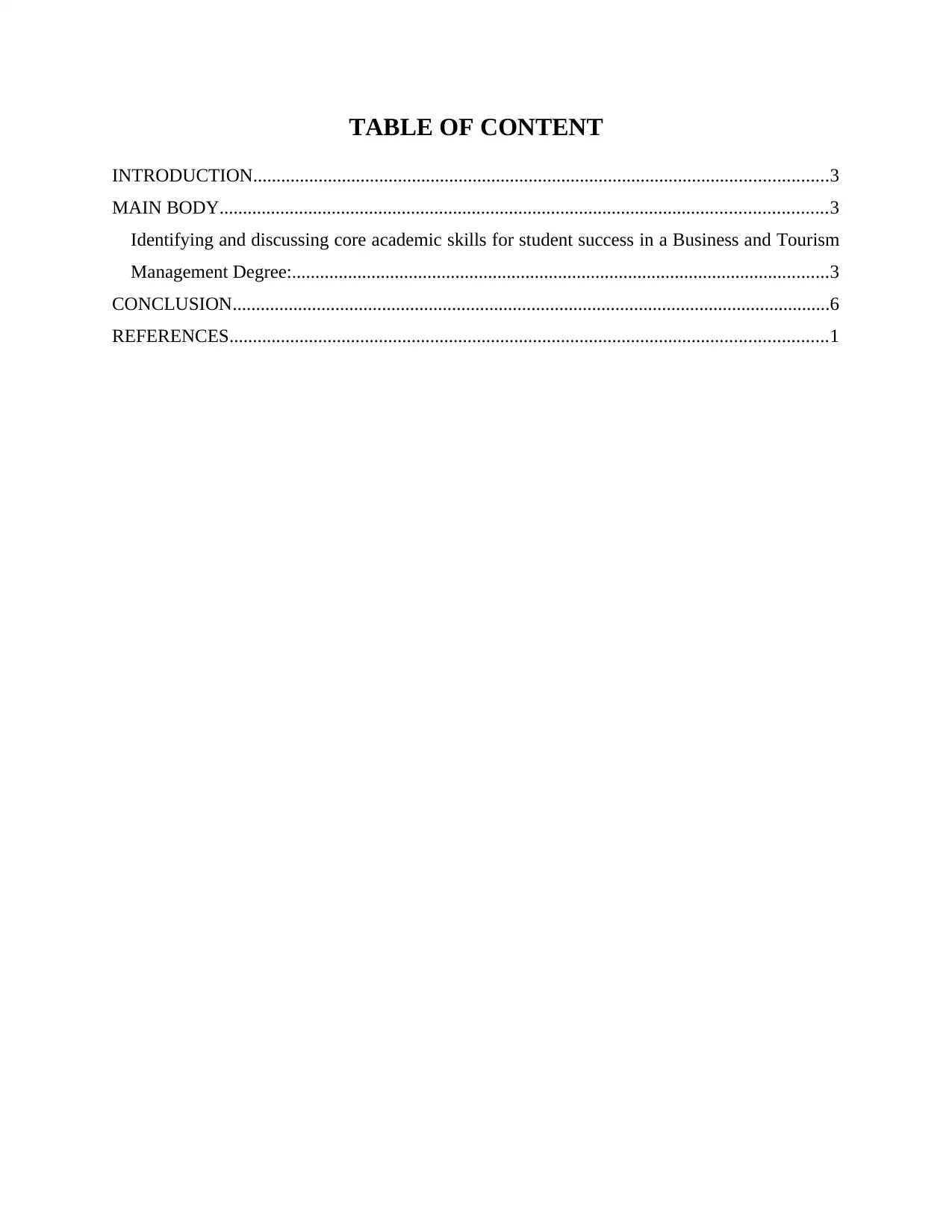
TABLE OF CONTENT
INTRODUCTION...........................................................................................................................3
MAIN BODY..................................................................................................................................3
Identifying and discussing core academic skills for student success in a Business and Tourism
Management Degree:...................................................................................................................3
CONCLUSION................................................................................................................................6
REFERENCES................................................................................................................................1
INTRODUCTION...........................................................................................................................3
MAIN BODY..................................................................................................................................3
Identifying and discussing core academic skills for student success in a Business and Tourism
Management Degree:...................................................................................................................3
CONCLUSION................................................................................................................................6
REFERENCES................................................................................................................................1
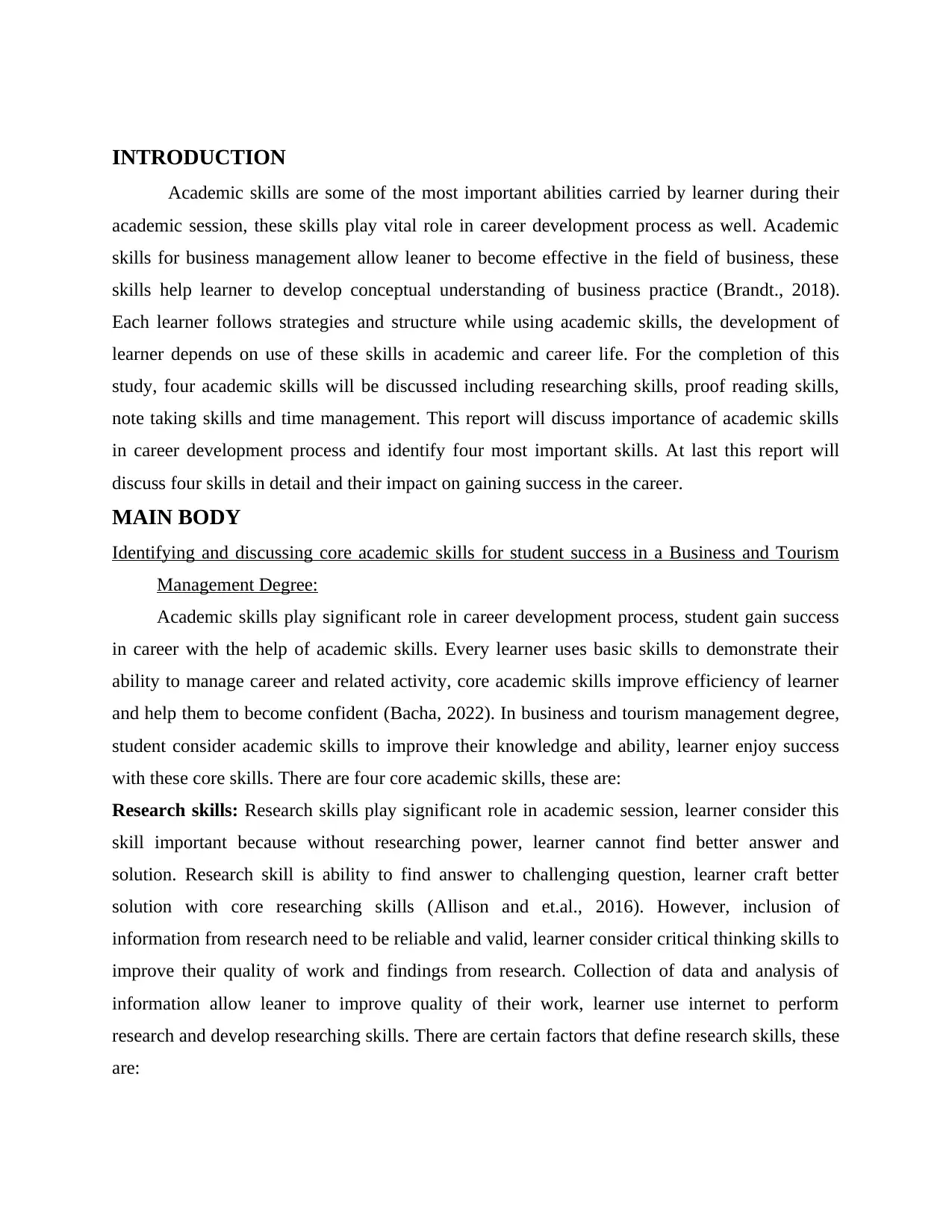
INTRODUCTION
Academic skills are some of the most important abilities carried by learner during their
academic session, these skills play vital role in career development process as well. Academic
skills for business management allow leaner to become effective in the field of business, these
skills help learner to develop conceptual understanding of business practice (Brandt., 2018).
Each learner follows strategies and structure while using academic skills, the development of
learner depends on use of these skills in academic and career life. For the completion of this
study, four academic skills will be discussed including researching skills, proof reading skills,
note taking skills and time management. This report will discuss importance of academic skills
in career development process and identify four most important skills. At last this report will
discuss four skills in detail and their impact on gaining success in the career.
MAIN BODY
Identifying and discussing core academic skills for student success in a Business and Tourism
Management Degree:
Academic skills play significant role in career development process, student gain success
in career with the help of academic skills. Every learner uses basic skills to demonstrate their
ability to manage career and related activity, core academic skills improve efficiency of learner
and help them to become confident (Bacha, 2022). In business and tourism management degree,
student consider academic skills to improve their knowledge and ability, learner enjoy success
with these core skills. There are four core academic skills, these are:
Research skills: Research skills play significant role in academic session, learner consider this
skill important because without researching power, learner cannot find better answer and
solution. Research skill is ability to find answer to challenging question, learner craft better
solution with core researching skills (Allison and et.al., 2016). However, inclusion of
information from research need to be reliable and valid, learner consider critical thinking skills to
improve their quality of work and findings from research. Collection of data and analysis of
information allow leaner to improve quality of their work, learner use internet to perform
research and develop researching skills. There are certain factors that define research skills, these
are:
Academic skills are some of the most important abilities carried by learner during their
academic session, these skills play vital role in career development process as well. Academic
skills for business management allow leaner to become effective in the field of business, these
skills help learner to develop conceptual understanding of business practice (Brandt., 2018).
Each learner follows strategies and structure while using academic skills, the development of
learner depends on use of these skills in academic and career life. For the completion of this
study, four academic skills will be discussed including researching skills, proof reading skills,
note taking skills and time management. This report will discuss importance of academic skills
in career development process and identify four most important skills. At last this report will
discuss four skills in detail and their impact on gaining success in the career.
MAIN BODY
Identifying and discussing core academic skills for student success in a Business and Tourism
Management Degree:
Academic skills play significant role in career development process, student gain success
in career with the help of academic skills. Every learner uses basic skills to demonstrate their
ability to manage career and related activity, core academic skills improve efficiency of learner
and help them to become confident (Bacha, 2022). In business and tourism management degree,
student consider academic skills to improve their knowledge and ability, learner enjoy success
with these core skills. There are four core academic skills, these are:
Research skills: Research skills play significant role in academic session, learner consider this
skill important because without researching power, learner cannot find better answer and
solution. Research skill is ability to find answer to challenging question, learner craft better
solution with core researching skills (Allison and et.al., 2016). However, inclusion of
information from research need to be reliable and valid, learner consider critical thinking skills to
improve their quality of work and findings from research. Collection of data and analysis of
information allow leaner to improve quality of their work, learner use internet to perform
research and develop researching skills. There are certain factors that define research skills, these
are:
⊘ This is a preview!⊘
Do you want full access?
Subscribe today to unlock all pages.

Trusted by 1+ million students worldwide
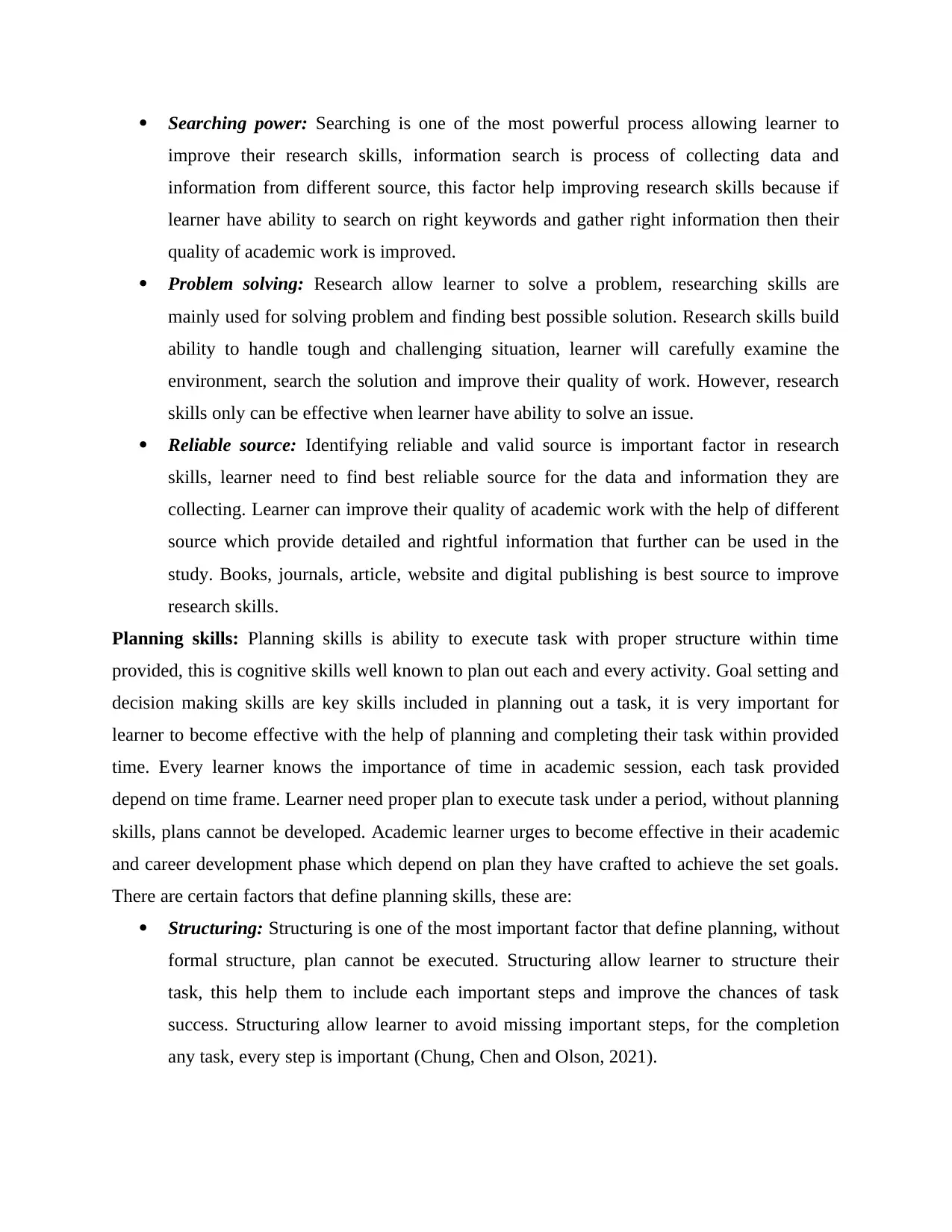
Searching power: Searching is one of the most powerful process allowing learner to
improve their research skills, information search is process of collecting data and
information from different source, this factor help improving research skills because if
learner have ability to search on right keywords and gather right information then their
quality of academic work is improved.
Problem solving: Research allow learner to solve a problem, researching skills are
mainly used for solving problem and finding best possible solution. Research skills build
ability to handle tough and challenging situation, learner will carefully examine the
environment, search the solution and improve their quality of work. However, research
skills only can be effective when learner have ability to solve an issue.
Reliable source: Identifying reliable and valid source is important factor in research
skills, learner need to find best reliable source for the data and information they are
collecting. Learner can improve their quality of academic work with the help of different
source which provide detailed and rightful information that further can be used in the
study. Books, journals, article, website and digital publishing is best source to improve
research skills.
Planning skills: Planning skills is ability to execute task with proper structure within time
provided, this is cognitive skills well known to plan out each and every activity. Goal setting and
decision making skills are key skills included in planning out a task, it is very important for
learner to become effective with the help of planning and completing their task within provided
time. Every learner knows the importance of time in academic session, each task provided
depend on time frame. Learner need proper plan to execute task under a period, without planning
skills, plans cannot be developed. Academic learner urges to become effective in their academic
and career development phase which depend on plan they have crafted to achieve the set goals.
There are certain factors that define planning skills, these are:
Structuring: Structuring is one of the most important factor that define planning, without
formal structure, plan cannot be executed. Structuring allow learner to structure their
task, this help them to include each important steps and improve the chances of task
success. Structuring allow learner to avoid missing important steps, for the completion
any task, every step is important (Chung, Chen and Olson, 2021).
improve their research skills, information search is process of collecting data and
information from different source, this factor help improving research skills because if
learner have ability to search on right keywords and gather right information then their
quality of academic work is improved.
Problem solving: Research allow learner to solve a problem, researching skills are
mainly used for solving problem and finding best possible solution. Research skills build
ability to handle tough and challenging situation, learner will carefully examine the
environment, search the solution and improve their quality of work. However, research
skills only can be effective when learner have ability to solve an issue.
Reliable source: Identifying reliable and valid source is important factor in research
skills, learner need to find best reliable source for the data and information they are
collecting. Learner can improve their quality of academic work with the help of different
source which provide detailed and rightful information that further can be used in the
study. Books, journals, article, website and digital publishing is best source to improve
research skills.
Planning skills: Planning skills is ability to execute task with proper structure within time
provided, this is cognitive skills well known to plan out each and every activity. Goal setting and
decision making skills are key skills included in planning out a task, it is very important for
learner to become effective with the help of planning and completing their task within provided
time. Every learner knows the importance of time in academic session, each task provided
depend on time frame. Learner need proper plan to execute task under a period, without planning
skills, plans cannot be developed. Academic learner urges to become effective in their academic
and career development phase which depend on plan they have crafted to achieve the set goals.
There are certain factors that define planning skills, these are:
Structuring: Structuring is one of the most important factor that define planning, without
formal structure, plan cannot be executed. Structuring allow learner to structure their
task, this help them to include each important steps and improve the chances of task
success. Structuring allow learner to avoid missing important steps, for the completion
any task, every step is important (Chung, Chen and Olson, 2021).
Paraphrase This Document
Need a fresh take? Get an instant paraphrase of this document with our AI Paraphraser
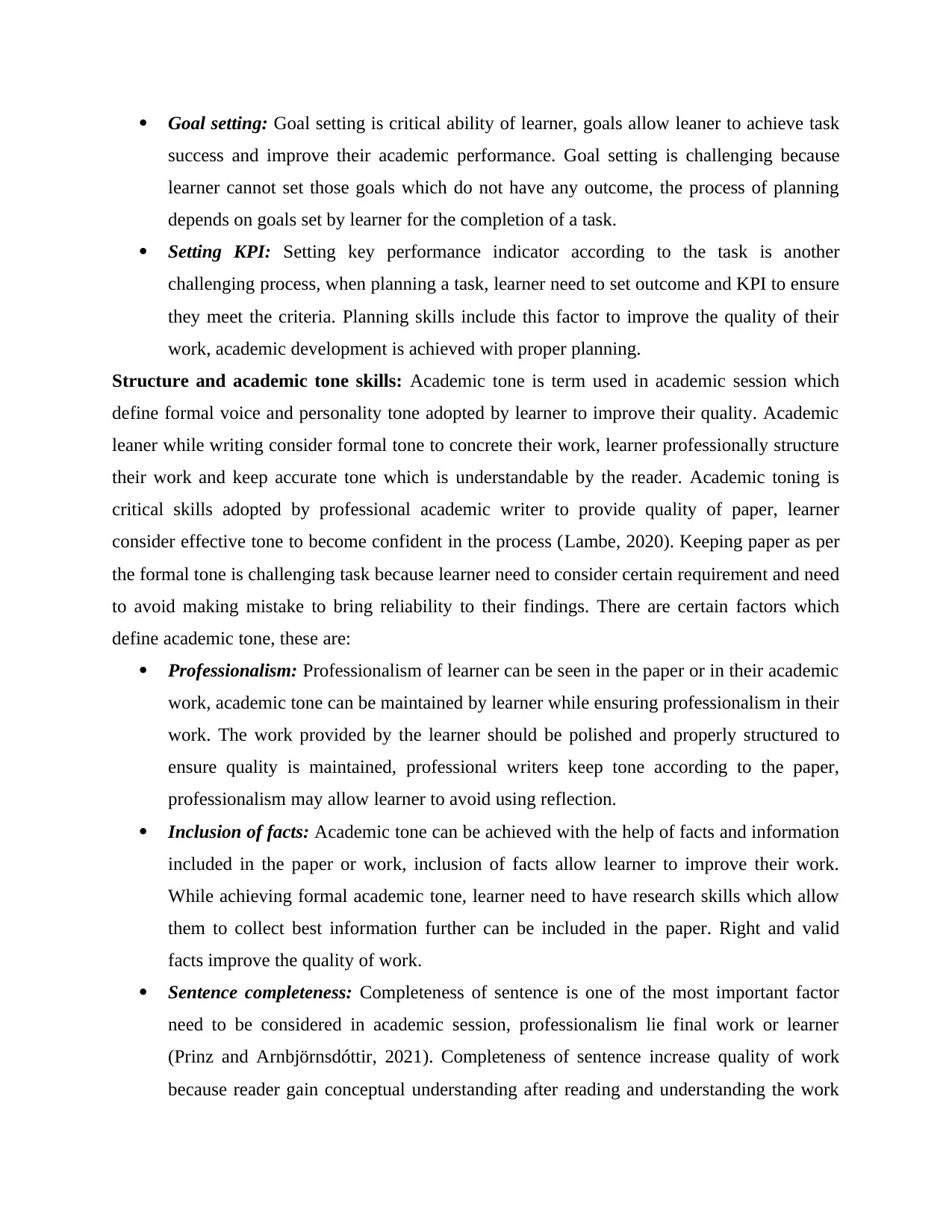
Goal setting: Goal setting is critical ability of learner, goals allow leaner to achieve task
success and improve their academic performance. Goal setting is challenging because
learner cannot set those goals which do not have any outcome, the process of planning
depends on goals set by learner for the completion of a task.
Setting KPI: Setting key performance indicator according to the task is another
challenging process, when planning a task, learner need to set outcome and KPI to ensure
they meet the criteria. Planning skills include this factor to improve the quality of their
work, academic development is achieved with proper planning.
Structure and academic tone skills: Academic tone is term used in academic session which
define formal voice and personality tone adopted by learner to improve their quality. Academic
leaner while writing consider formal tone to concrete their work, learner professionally structure
their work and keep accurate tone which is understandable by the reader. Academic toning is
critical skills adopted by professional academic writer to provide quality of paper, learner
consider effective tone to become confident in the process (Lambe, 2020). Keeping paper as per
the formal tone is challenging task because learner need to consider certain requirement and need
to avoid making mistake to bring reliability to their findings. There are certain factors which
define academic tone, these are:
Professionalism: Professionalism of learner can be seen in the paper or in their academic
work, academic tone can be maintained by learner while ensuring professionalism in their
work. The work provided by the learner should be polished and properly structured to
ensure quality is maintained, professional writers keep tone according to the paper,
professionalism may allow learner to avoid using reflection.
Inclusion of facts: Academic tone can be achieved with the help of facts and information
included in the paper or work, inclusion of facts allow learner to improve their work.
While achieving formal academic tone, learner need to have research skills which allow
them to collect best information further can be included in the paper. Right and valid
facts improve the quality of work.
Sentence completeness: Completeness of sentence is one of the most important factor
need to be considered in academic session, professionalism lie final work or learner
(Prinz and Arnbjörnsdóttir, 2021). Completeness of sentence increase quality of work
because reader gain conceptual understanding after reading and understanding the work
success and improve their academic performance. Goal setting is challenging because
learner cannot set those goals which do not have any outcome, the process of planning
depends on goals set by learner for the completion of a task.
Setting KPI: Setting key performance indicator according to the task is another
challenging process, when planning a task, learner need to set outcome and KPI to ensure
they meet the criteria. Planning skills include this factor to improve the quality of their
work, academic development is achieved with proper planning.
Structure and academic tone skills: Academic tone is term used in academic session which
define formal voice and personality tone adopted by learner to improve their quality. Academic
leaner while writing consider formal tone to concrete their work, learner professionally structure
their work and keep accurate tone which is understandable by the reader. Academic toning is
critical skills adopted by professional academic writer to provide quality of paper, learner
consider effective tone to become confident in the process (Lambe, 2020). Keeping paper as per
the formal tone is challenging task because learner need to consider certain requirement and need
to avoid making mistake to bring reliability to their findings. There are certain factors which
define academic tone, these are:
Professionalism: Professionalism of learner can be seen in the paper or in their academic
work, academic tone can be maintained by learner while ensuring professionalism in their
work. The work provided by the learner should be polished and properly structured to
ensure quality is maintained, professional writers keep tone according to the paper,
professionalism may allow learner to avoid using reflection.
Inclusion of facts: Academic tone can be achieved with the help of facts and information
included in the paper or work, inclusion of facts allow learner to improve their work.
While achieving formal academic tone, learner need to have research skills which allow
them to collect best information further can be included in the paper. Right and valid
facts improve the quality of work.
Sentence completeness: Completeness of sentence is one of the most important factor
need to be considered in academic session, professionalism lie final work or learner
(Prinz and Arnbjörnsdóttir, 2021). Completeness of sentence increase quality of work
because reader gain conceptual understanding after reading and understanding the work
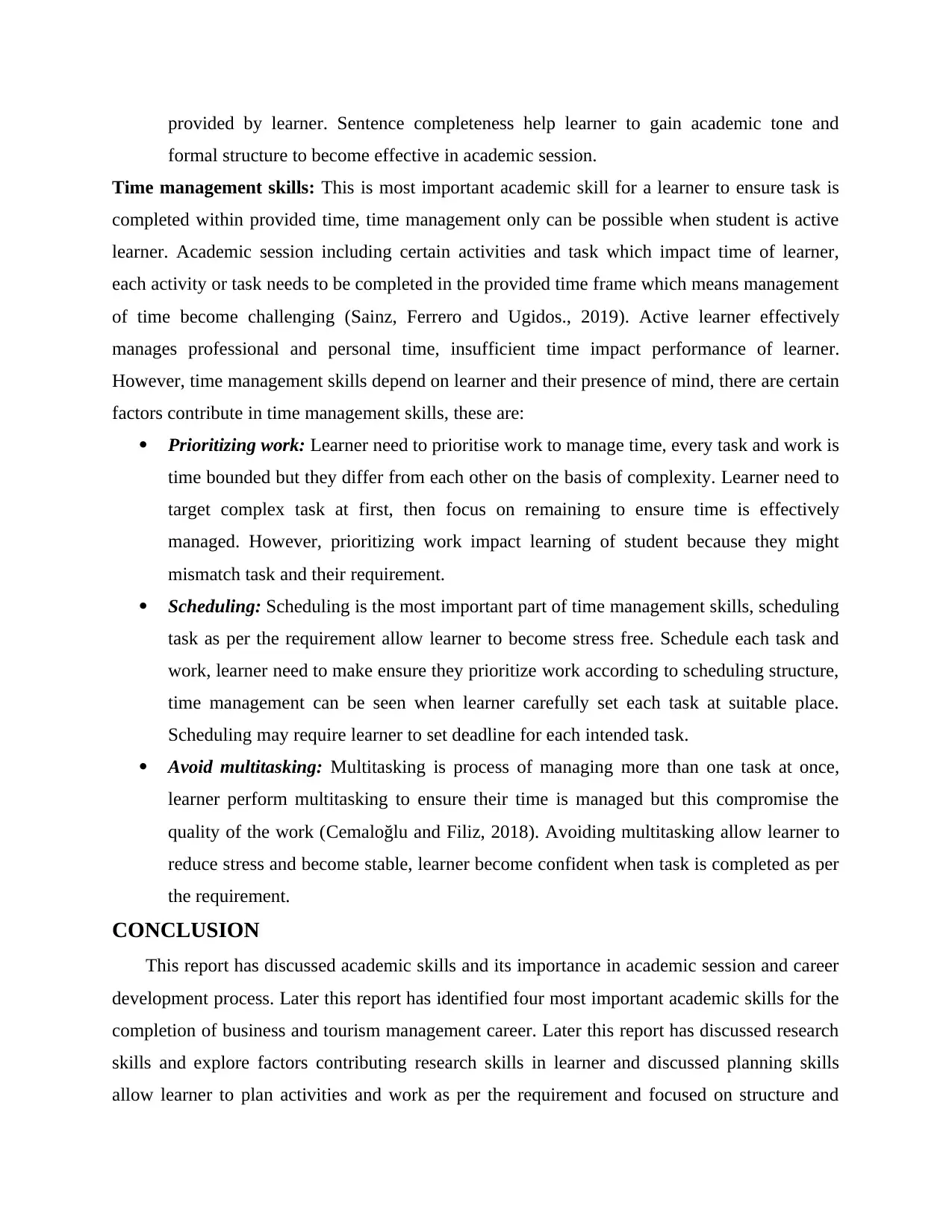
provided by learner. Sentence completeness help learner to gain academic tone and
formal structure to become effective in academic session.
Time management skills: This is most important academic skill for a learner to ensure task is
completed within provided time, time management only can be possible when student is active
learner. Academic session including certain activities and task which impact time of learner,
each activity or task needs to be completed in the provided time frame which means management
of time become challenging (Sainz, Ferrero and Ugidos., 2019). Active learner effectively
manages professional and personal time, insufficient time impact performance of learner.
However, time management skills depend on learner and their presence of mind, there are certain
factors contribute in time management skills, these are:
Prioritizing work: Learner need to prioritise work to manage time, every task and work is
time bounded but they differ from each other on the basis of complexity. Learner need to
target complex task at first, then focus on remaining to ensure time is effectively
managed. However, prioritizing work impact learning of student because they might
mismatch task and their requirement.
Scheduling: Scheduling is the most important part of time management skills, scheduling
task as per the requirement allow learner to become stress free. Schedule each task and
work, learner need to make ensure they prioritize work according to scheduling structure,
time management can be seen when learner carefully set each task at suitable place.
Scheduling may require learner to set deadline for each intended task.
Avoid multitasking: Multitasking is process of managing more than one task at once,
learner perform multitasking to ensure their time is managed but this compromise the
quality of the work (Cemaloğlu and Filiz, 2018). Avoiding multitasking allow learner to
reduce stress and become stable, learner become confident when task is completed as per
the requirement.
CONCLUSION
This report has discussed academic skills and its importance in academic session and career
development process. Later this report has identified four most important academic skills for the
completion of business and tourism management career. Later this report has discussed research
skills and explore factors contributing research skills in learner and discussed planning skills
allow learner to plan activities and work as per the requirement and focused on structure and
formal structure to become effective in academic session.
Time management skills: This is most important academic skill for a learner to ensure task is
completed within provided time, time management only can be possible when student is active
learner. Academic session including certain activities and task which impact time of learner,
each activity or task needs to be completed in the provided time frame which means management
of time become challenging (Sainz, Ferrero and Ugidos., 2019). Active learner effectively
manages professional and personal time, insufficient time impact performance of learner.
However, time management skills depend on learner and their presence of mind, there are certain
factors contribute in time management skills, these are:
Prioritizing work: Learner need to prioritise work to manage time, every task and work is
time bounded but they differ from each other on the basis of complexity. Learner need to
target complex task at first, then focus on remaining to ensure time is effectively
managed. However, prioritizing work impact learning of student because they might
mismatch task and their requirement.
Scheduling: Scheduling is the most important part of time management skills, scheduling
task as per the requirement allow learner to become stress free. Schedule each task and
work, learner need to make ensure they prioritize work according to scheduling structure,
time management can be seen when learner carefully set each task at suitable place.
Scheduling may require learner to set deadline for each intended task.
Avoid multitasking: Multitasking is process of managing more than one task at once,
learner perform multitasking to ensure their time is managed but this compromise the
quality of the work (Cemaloğlu and Filiz, 2018). Avoiding multitasking allow learner to
reduce stress and become stable, learner become confident when task is completed as per
the requirement.
CONCLUSION
This report has discussed academic skills and its importance in academic session and career
development process. Later this report has identified four most important academic skills for the
completion of business and tourism management career. Later this report has discussed research
skills and explore factors contributing research skills in learner and discussed planning skills
allow learner to plan activities and work as per the requirement and focused on structure and
⊘ This is a preview!⊘
Do you want full access?
Subscribe today to unlock all pages.

Trusted by 1+ million students worldwide
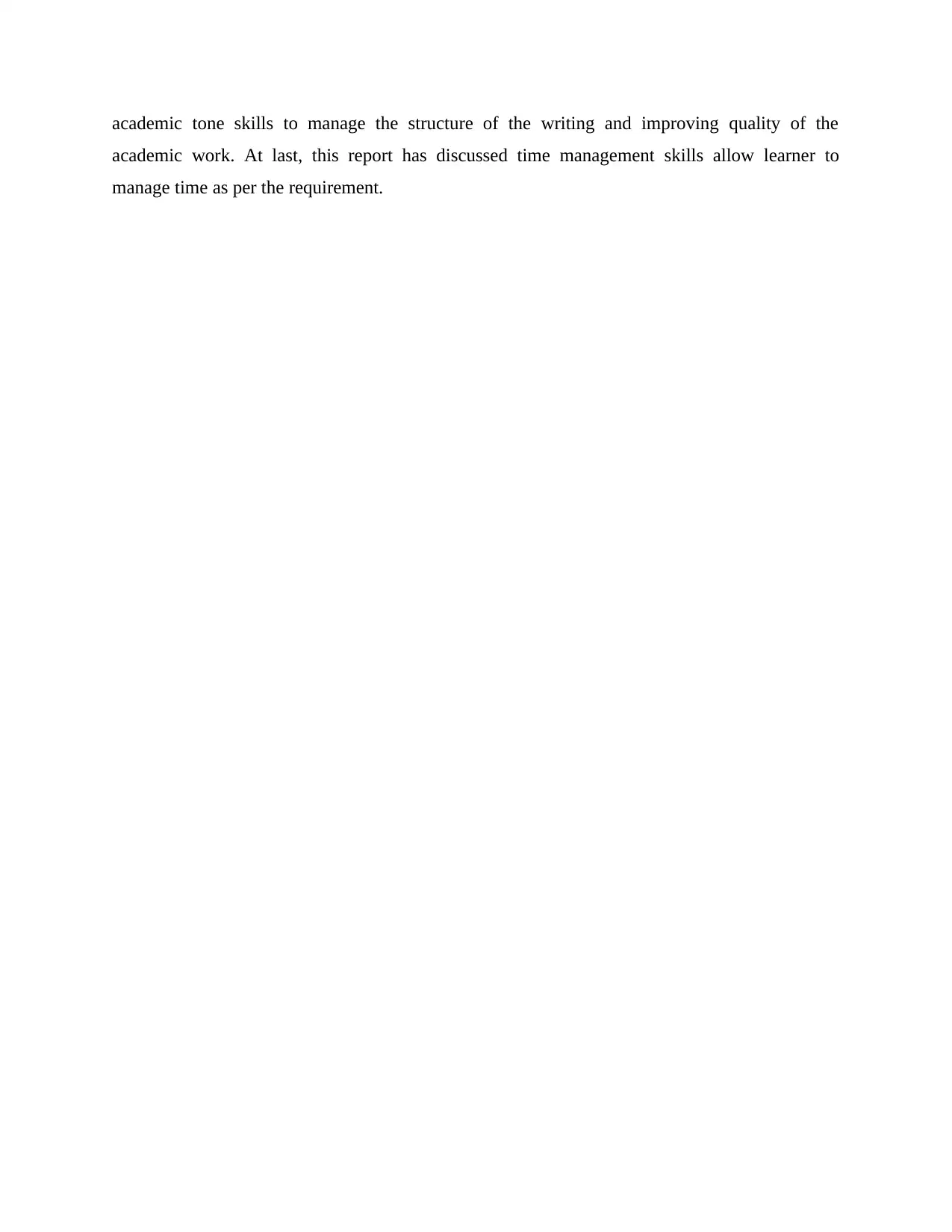
academic tone skills to manage the structure of the writing and improving quality of the
academic work. At last, this report has discussed time management skills allow learner to
manage time as per the requirement.
academic work. At last, this report has discussed time management skills allow learner to
manage time as per the requirement.
Paraphrase This Document
Need a fresh take? Get an instant paraphrase of this document with our AI Paraphraser
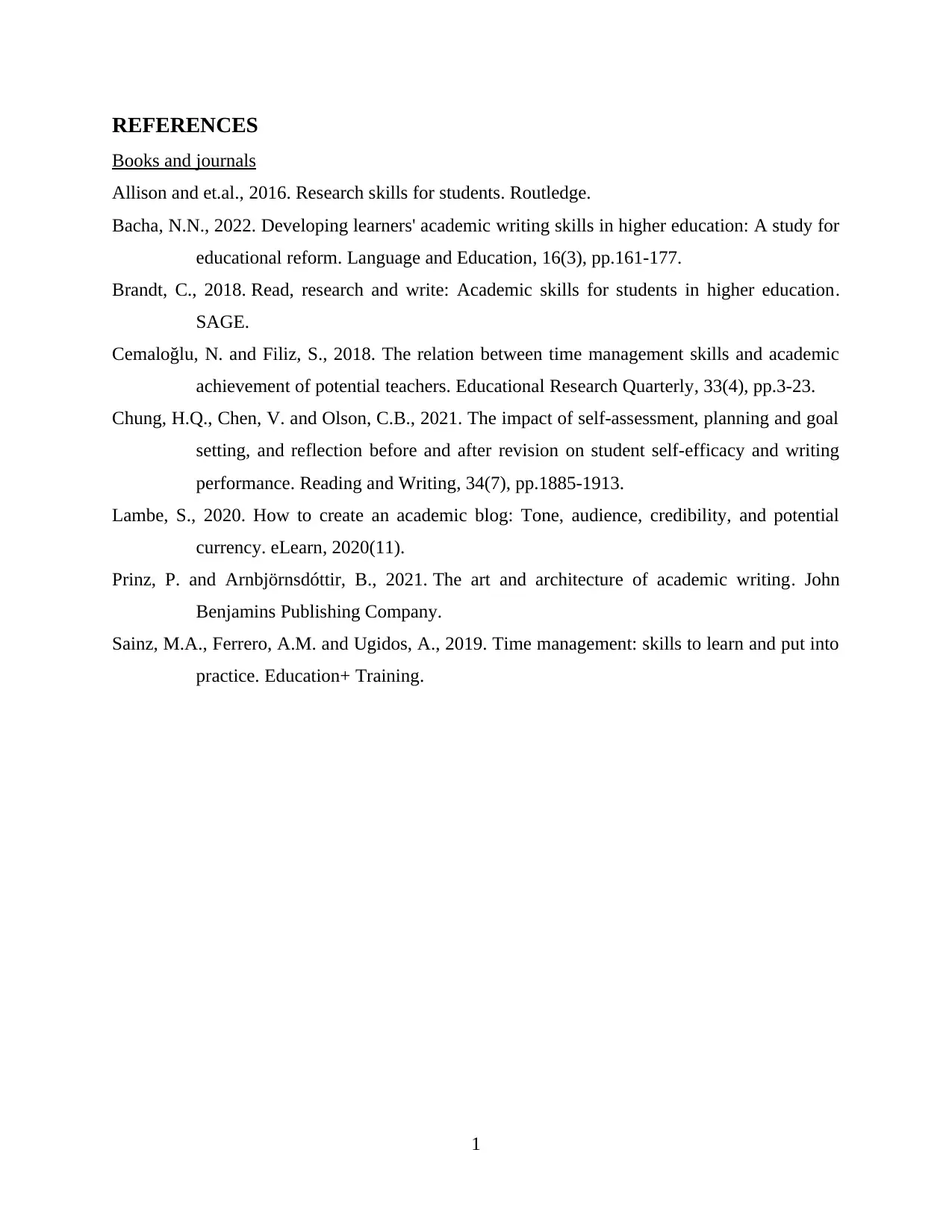
REFERENCES
Books and journals
Allison and et.al., 2016. Research skills for students. Routledge.
Bacha, N.N., 2022. Developing learners' academic writing skills in higher education: A study for
educational reform. Language and Education, 16(3), pp.161-177.
Brandt, C., 2018. Read, research and write: Academic skills for students in higher education.
SAGE.
Cemaloğlu, N. and Filiz, S., 2018. The relation between time management skills and academic
achievement of potential teachers. Educational Research Quarterly, 33(4), pp.3-23.
Chung, H.Q., Chen, V. and Olson, C.B., 2021. The impact of self-assessment, planning and goal
setting, and reflection before and after revision on student self-efficacy and writing
performance. Reading and Writing, 34(7), pp.1885-1913.
Lambe, S., 2020. How to create an academic blog: Tone, audience, credibility, and potential
currency. eLearn, 2020(11).
Prinz, P. and Arnbjörnsdóttir, B., 2021. The art and architecture of academic writing. John
Benjamins Publishing Company.
Sainz, M.A., Ferrero, A.M. and Ugidos, A., 2019. Time management: skills to learn and put into
practice. Education+ Training.
1
Books and journals
Allison and et.al., 2016. Research skills for students. Routledge.
Bacha, N.N., 2022. Developing learners' academic writing skills in higher education: A study for
educational reform. Language and Education, 16(3), pp.161-177.
Brandt, C., 2018. Read, research and write: Academic skills for students in higher education.
SAGE.
Cemaloğlu, N. and Filiz, S., 2018. The relation between time management skills and academic
achievement of potential teachers. Educational Research Quarterly, 33(4), pp.3-23.
Chung, H.Q., Chen, V. and Olson, C.B., 2021. The impact of self-assessment, planning and goal
setting, and reflection before and after revision on student self-efficacy and writing
performance. Reading and Writing, 34(7), pp.1885-1913.
Lambe, S., 2020. How to create an academic blog: Tone, audience, credibility, and potential
currency. eLearn, 2020(11).
Prinz, P. and Arnbjörnsdóttir, B., 2021. The art and architecture of academic writing. John
Benjamins Publishing Company.
Sainz, M.A., Ferrero, A.M. and Ugidos, A., 2019. Time management: skills to learn and put into
practice. Education+ Training.
1
1 out of 8
Related Documents
Your All-in-One AI-Powered Toolkit for Academic Success.
+13062052269
info@desklib.com
Available 24*7 on WhatsApp / Email
![[object Object]](/_next/static/media/star-bottom.7253800d.svg)
Unlock your academic potential
Copyright © 2020–2026 A2Z Services. All Rights Reserved. Developed and managed by ZUCOL.



